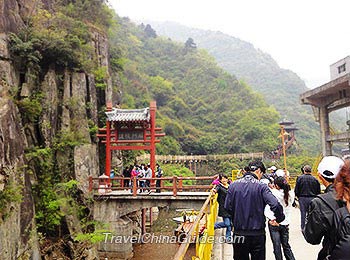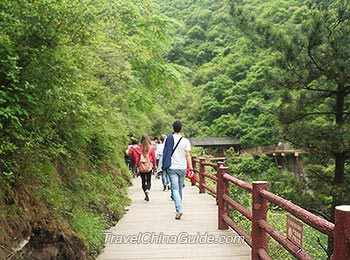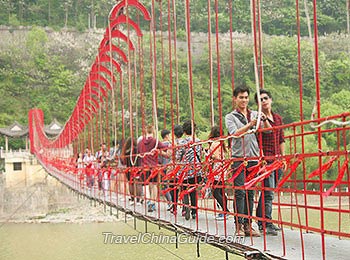Shimen Plank Road Scenic Area
 |
| Shimen Plank Road, Hanzhong |
Shimen Plank Road
Among the countless ancient plank roads, Baoxie Plank Road is the most famous one. It was originally built in the Han Dynasty (202 BC - 220 AD). The place where the south entrance was located was called Bao and the north entrance was called Xie, thus the plank road was named Baoxie. It was 146 miles long. However, the original Baoxie Plank Road has been destroyed, only leaving holes in the mountain.
In 1969, along with the construction of Shimen Dam, the south entrance of ancient Baoxie Plank Road was flooded and an imitation was built on the cliff 77 feet above its former location. The new plank road, Shimen Plank Road is hanging on the cliff with a length of 2.03 miles (3.26 km). It fully follows the building styles of the ancient Baoxie Plank Road and perfectly reproduces a courier station, three postal kiosks, two trestle bridges and the original Tianxin Bridge.
|
|
Shimen Tunnel
Inside the original tunnel and on its surrounding cliff, many famous officials and scholars in ancient times left inscriptions. They have been moved to Hanzhong Museum for better protection because of the construction of the dam.
Shimen Dam
Besides, you can also travel on the Baohe River by a boat, which would be a good way to experience the charm of nature and appreciate the sceneries along the riverside. The blue sky, fresh air, bright sunlight, green trees and mountains will guarantee you a wonderful journey. And when you travel around the scenic area, the Jitou Pass, Archaized Street, Lover Bridge and many statues will also leave you a great impression. Many statues there will provide a chance for you to know more about the stories of the Three Kingdoms and Chinese history.
Take bus no. 21 or 102 to Hedongdian Village, and then walk about 20 minutes northward to the destination.
| March - November | December to the Next February | |
| Admission Fee | CNY 75 | CNY 55 |
| Opening Hours | 08:10 – 17:50 | 08:10 – 17:20 |
As an important traffic hub along the way from Shaanxi to Sichuan in ancient times, which is blocked by Qinling Mountains, Hanzhong city has many plank roads except the famous Baoxie Road, such as Ziwu Road, Jinniu Road, Litchi Road, Micang Road, Chencang Road, and Lianyun Road. But it is a pity that we cannot travel along every route nowadays because most of them have been destroyed and only some relics remain.
- Last updated on Apr. 13, 2021 -

